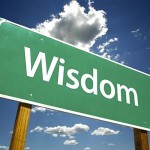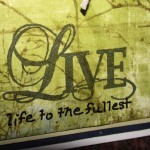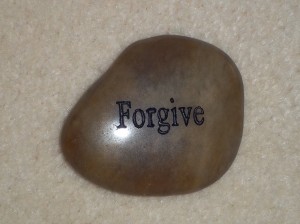The Sisters of St. Joseph are a remarkable group of nuns, devoted to the spiritual life, teaching and the pursuit of social justice. In the Motherhouse in Rochester, NY, I visited Sr. Maria, age 93. Although her body was beginning to fail her, she was clear-eyed and enthusiastic. I have thought about Sr. Maria often, and I was deeply saddened to learn last week that she has left this world (or as she would have put it, moved on to the next life!). Her lessons for living, however, stay on in the Legacy Project.
She told me right off that she was born on Election Day, 1916, when Woodrow Wilson was re-elected the President of the United States. Her parents were Polish immigrants, hard-working and deeply religious.
She grew up in a close-knit Polish neighborhood.
It was a close community because all the people in the neighborhood were from Poland, or Russia or Ukraine, so they were all neighbors from Europe and they maintained their own language. It was a homey place with little stores, mom-and-pop stores, and the meat market was a meat market. It wasn’t everything, it was a meat market. The grocery store had groceries, the bakery was just bakery. It was translation from Europe and it was maintained like that for many years. The Polish bakery was just marvelous. And it was a wonderful business, especially around Christmas time, Easter time, you had to buy tickets to wait in line to do your shopping.
And the church was the center of activity, things were centered about the church, and when we think of people not having a social security, well that wasn’t in vogue yet. But the people – the church groups, the people from the same villages of Poland – grouped together and formed societies. So there would be St. Casimir society, St. Stanislas, St. Lawrence, and each society would have certain plans to provide for the members. We paid like maybe fifty cents a month for dues but if you were sick you would get groceries for a week, two weeks and other benefits. And people from these societies had projects like a dinner dance, activities connected with church to raise funds.
It’s sad because people now are not as close. We knew everybody in the neighborhood. I could name every family on our street, the name of their children, and you respected everybody’s family. If someone else’s mother told you not to do that, you had to listen, you had to obey. And growing up we just thought that our neighborhood, that’s all there was. Our own little world, the stores were there, the grocery stores, the meat market, the bakery, the shoe repair shop, everything was right in line.
Sr. Maria didn’t speak English until she started school, “First grade was a little difficult because I had to learn to speak English and learn how to read in English and my mother didn’t help me because she didn’t know the words, she didn’t know the language. If she tried to say it, she would say it with an accent. So in school I sat on a little step and a girl whose parents were Americanized already would sit with me to help me read, listen to me read.” She was determined to speak “like an American,” and achieved that goal.
Some her most important life lessons were learned during the depression. Her father’s work schedule was reduced, and the family had to learn how to live on very little. “Bread and butter was a treat.” Her advice to people going through current economic difficulties is this: “We should be grateful if we have what we need, even if we don’t have all the delicacies we want. We never knew we were poor. There were people who were poorer. We had enough to eat and that was a big blessing.
An even more important lesson Sr. Maria learned during the Depression was compassion. Even though her family had little, they shared with those who had less.
There was one family whose father didn’t have a job. Wherever he worked he lost his job, so there was no income coming. But I remember some evenings, maybe once a week, my mother would fix up a basket with some groceries, maybe a head of cabbage, some potatoes, vegetables, and put it on their porch after dark. And she herself had come from Poland and they had had hard times. And I remember seeing her many times, if she was going to eat a piece of bread she would pray over it first and she would kiss it sometimes too. Yes, they were hungry many times, so we grew up with that respect to appreciate what we had.
As Sr. Maria retired and grew older, the importance of compassion as a life lesson increased.
The idea that everything we do to help someone else, there’s a return value in it. You realize that you did something for that person, and at the time you didn’t understand it well yourself. Sometimes I receive a message, a note or card, from a student that I taught fifty years ago, and they’ll say that they appreciate what I did for them, that if I hadn’t done that they would never have succeeded. Like this one boy told me recently that if I hadn’t coached him special when he was my eighth grader he never could have gone to high school. He wouldn’t have had that motivation. You couldn’t help everyone, but you did as much as you could to as many as you could.
It’s not surprising that someone who had been a nun for over 70 years would recommend include pursuing a spiritual life among her major lessons:
Well. I think that the first lesson would be that you have a relationship with God and you live by his teachings and his commandments. Because by ourselves we can’t really do too much. And we have abilities and powers, but everything that we have is a gift from God to use and to give it back to Him.
For Sr. Maria, this lesson led again to compassion:
And I think being considerate for other people is important. And there are many small ways and gracious ways to do kindnesses and thoughtful actions. And if I know that I have something I know someone would like, maybe I can graciously get it into her possession without her knowing it. You try to help other people, you encourage others, you assist others.
At the end of our interview, we talked about the end of life. Sr. Maria told me:
Well, you do think about it more often and you do realize that we’re not here forever and we have to face God in the end. I’m not sure if I’m completely at that stage yet. Well, God has been good. You know, I don’t know if I pray as much as I ought to pray for death and acceptance. It’s still kind of, I know it’s going to come, and I tell the Lord: ‘I’m ready Lord – but maybe not yet!” Life is a gift from God and it’s important to keep busy – not just busy, but active. Meaningfully active.
It’s never easy when we lose one of the Legacy Project respondents, but we can still profit from their lessons. And that’s a good argument for asking our loved ones about their lessons for living – while they are still with us!
 highs and gathering possessions, but Mary believes it lies in emotional states like equanimity and awe.
highs and gathering possessions, but Mary believes it lies in emotional states like equanimity and awe.



